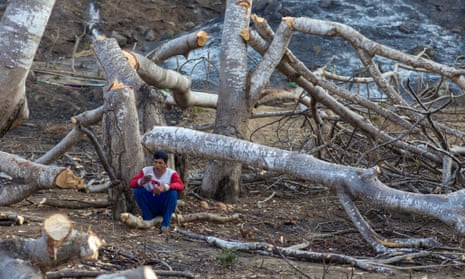The industry of palm oil, the product found in everything from chocolate to lipstick that is habitually reviled by environmentalists, is facing new challenges due to unrest in key producing regions.
It was reported by the Cameroonian Association of Oil Refineries this month that the export of refined products including palm oil from several African nations, including Nigeria and Cameroon, has been “virtually at a standstill” for several months due to a spate of murders and kidnappings committed by Islamic militant group Boko Haram.
The unexpected slowdown in palm oil production in Africa, seen as a key growth area for the product, comes as political tensions are heightening in Indonesia, the world’s leading producer of palm oil.
According to statistics from the Food and Agriculture Organization of the United Nations, Indonesia produces around 30m tonnes of crude palm oil a year and, along with Malaysia, accounts for nearly 90% of the world’s supply.
Proponents of palm oil point out that it’s cheap and efficient to grow and use, although critics point out that huge tracts of rainforest have been cleared – at a rate of around 690,000 hectares a year between 2006 and 2010 – to make way for the crop, putting engendered species such as the orangutan under severe threat.
Corruption claims
The rampant, and often illegal, clearing of land has also affected small landholders and is increasingly causing tension between the Indonesian government and the administrations that run the country’s provinces.
Following the end of Suharto’s 31-year dictatorship in 1998, Indonesia went through a process of decentralising power. Much of the power over land allocation flowed to bupatis (little kings) who preside over districts and have been accused of widespread corruption in the way they hand out logging concessions.
“They take decisions in best interest of companies, often from Singapore or Jakarta, rather than communities,” said Tomasz Johnson, forests campaigner at the Environmental Investigation Agency (EIA).
The EIA conducted an in-depth investigation into the palm oil industry last year and found multiple instances of corruption and lax law enforcement.
Violations included the flouting of plantation licensing laws, attempts by a palm oil firm to bribe police to drop an investigation into its activities and regional governments transferring community resources to private firms.
“When companies come up against opposition from communities, bupatis will mobilise state forces against them,” says Johnson, whose research has focused on the central Kalimantan area.
“There is low level oppression and sometimes violence. In Kalimantan it’s rare that you go into community where there’s not conflict. Often, communities have given up hope of holding onto their land.
“We went to see one concession where the community believes someone was killed by security forces that were employed by a palm oil company. These people just can’t win, it’s a simmering human rights issue.”
Local land grabs
The situation appears like it may come to a head over a contentious plan by the largely autonomous government of Aceh, on the island of Sumatra, to open up the pristine Leuser ecosystem to development. Aceh gained greater autonomy in return for an end to the armed struggle waged by separatists that largely faded following the 2004 tsunami.
The road expansion and deforestation plan, which conservationists fear would threaten two of the three largest remaining Sumatran orangutan populations and increase instances of disastrous landslides, has yet to be ratified by the Indonesian government.
There are indications that the central Jakarta administration isn’t entirely happy with the pro-palm oil development decisions taken by Aceh governor Zaini Abdullah, whose predecessor Irwandi Yusuf was seen as sympathetic to environmental concerns and enthusiastically embraced the REDD+ scheme, whereby wealthy nations paid Indonesia to preserve its rainforests.
President Joko Widodo has warned: “We mustn’t allow our tropical rainforest to disappear because of monoculture plantations like oil palm.”
David Gaveau, a scientist at the Center for International Forestry Research, said: “The central government is now trying to pull back that power and recentralise things. They realised it all went too far. It’s uncertain which way things will go, but there’s certainly a lot of tension around it.
“Members of the local governments are actually encouraging people to grab land that’s under control of central government. The central government is then trying to enforce the law and arresting people. It’s a cat and mouse game.”
The result of a shift back to centralised government could impact the growing number of small palm oil operators who largely conduct their business free of any regulatory interference, at a time when many of the major palm oil players have committed to more sustainable practices and to reduce deforestation.
“There are rogue operators who are playing the corruption game with the local authorities,” said Gaveau. “They get land through dodgy deals and they are totally under the radar, they basically do what they want while the big companies are trying to clean up their acts.
“A big problem is the overlapping land rights, which causes a lot of conflict. When you don’t have any power, someone can come in and clear your land, even though that goes against the country’s constitution. While Indonesia is largely an agrarian society, there is an increasingly wealthy middle class who see land as an investment for the future.”
The palm oil debate is funded by the Roundtable on Sustainable Palm Oil. All content is editorially independent except for pieces labelled advertisement feature. Find out more here.
Join the community of sustainability professionals and experts. Become a GSB member to get more stories like this direct to your inbox.

Comments (…)
Sign in or create your Guardian account to join the discussion